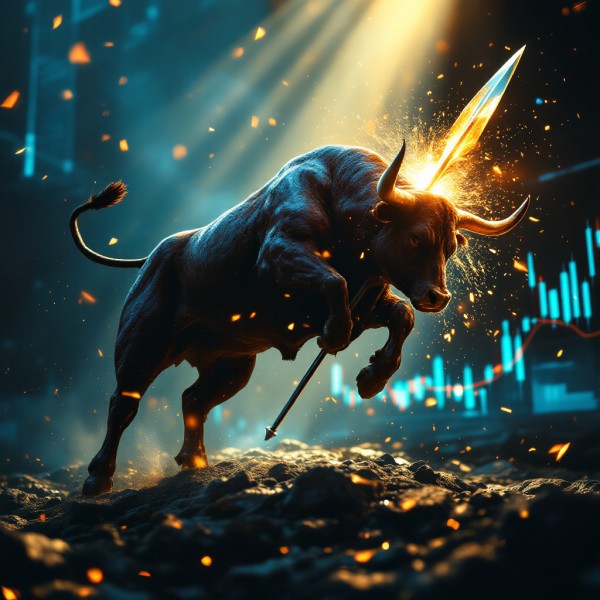What Happens to the Economy If the Stock Market Crashes? Panic for Most, Profit for the Bold
April 1, 2025
The weak panic. The strong prepare. The elite? They execute. Every stock market crash is a psychological bloodbath where fools drown in fear, while the few carve out empires. The economy shakes, but the intelligent know: chaos births opportunity.
A market crash is not just a financial event—it’s a psychological war zone. Headlines scream doom, analysts predict catastrophe, and the masses react like headless chickens. But step back, zoom out, and the truth emerges: every historic crash was the birthing ground of the next financial dynasty. This isn’t optimism; it’s raw data. The Great Depression set the stage for the biggest industrial boom. The 2008 crisis birthed tech giants. The COVID crash? It minted trillion-dollar market caps. The question isn’t, “Will the economy recover?” It’s “Who will own the next wave?”
Those who understand market cycles know this is the greatest wealth transfer mechanism ever created. The uninformed liquidate in fear; the informed accumulate in silence. The herd panics. The Titans prepare. And when the dust settles, it’s the ones who had conviction, capital, and cold-blooded execution who emerge on top.
? The Illusion of Economic Collapse
✔️ A stock market crash doesn’t equal economic Armageddon. The mainstream noise machine will pump hysteria, amplifying fear to deafening levels. But history is ruthless in its lessons: every crash is a transfer of wealth from the uninformed to the prepared.
✔️ Liquidity crunch? Yes. End of capitalism? No. When the market nosedives, companies tighten, layoffs spike, and consumer sentiment collapses. But this is a pressure test, not a funeral. The Federal Reserve intervenes. The government steps in. The system resets, recalibrates, and prepares for the next wave.
? The Psychology of Collapse: Fools Flee, Titans Buy
Mass psychology dictates that most people react, not anticipate. The herd sees red charts and spirals into loss aversion. They sell at rock-bottom prices, reinforcing the doom-loop narrative. The elite, however, feast on this carnage. They acquire elite assets at fire-sale prices, positioning themselves for the next inevitable bull run.
✔️ Loss Aversion: The pain of losing $1 is psychologically twice as powerful as the joy of gaining $1. Retail traders sell in terror, while the institutional whales buy in silence.
✔️ Narrative Fallacy: People connect unrelated dots, convinced that a crash signals an apocalyptic future. Reality? Every crash in history has led to a new boom cycle. Every. Single. One.
? Technical Warfare: The Smart Money Blueprint
Markets are never random. They follow repeatable patterns—if you know where to look. Two battle-tested tools reveal the rebound zone before the herd sees it:
1️⃣ Volume Profile: Who’s Accumulating in the Shadows?
When prices crater, smart money steps in before the bottom is visible to the public. High volume at key levels signals quiet accumulation. Watch for abnormally high volume during a crash—that’s the footprint of institutional buyers. ✔️ Key Insight: The deeper the crash, the bigger the long-term rewards. When volume surges at historical support zones, it’s a flashing green light for elite traders.
2️⃣ Bollinger Band Squeeze: When Volatility Breaks, Wealth Shifts
As fear peaks, markets hit extreme volatility compression. A Bollinger Band squeeze signals the next high-impact move. If price breaks above the squeeze after a crash, it confirms trend reversal—the first step of the next bull run.
✔️ Key Insight: The best buys happen before the breakout. The masses wait for confirmation. The informed strike first.
The Vector of Recovery: Why This Isn’t the End
History is written in cycles—destruction and rebirth. Every market implosion sets the stage for an even greater expansion. The Great Depression, the 2008 financial crisis, even the chaos of 2020—each one a bloodbath, followed by an era of unprecedented wealth creation. The only ones who lost permanently were those who mistook the storm for the end instead of the beginning.
Liquidity is the heartbeat of the markets. And like clockwork, the tide will turn. The Fed will cut rates, capital will flood the system, and those who positioned themselves early will ride the next wave. The masses will chase after the fact, buying at new highs, while the informed have already claimed their fortune at the bottom.
This recovery won’t just be about stocks bouncing back—it will be about transformation. AI, disruptive tech, and the next wave of industry leaders are already emerging from the wreckage. The last cycle made trillion-dollar giants out of companies most ignored during the downturn. This one will be no different.
So, the real question isn’t whether recovery will happen—it’s whether you’ll be early enough to own the future or just another spectator watching from the sidelines.
In Summing Up: The Ruthless Strategy of the Elite
The economy doesn’t collapse—it evolves. But evolution is merciless. Those who fail to adapt are swept aside while the calculated and the cunning seize control.
A crash isn’t the end; it’s a wealth transfer. The rules don’t change—the players do. The uninformed panic, sell at the worst possible moment, and watch their wealth evaporate. The prepared? They see the opportunity, move silently, and position themselves for the next seismic shift.
Fear is the ultimate weapon of control. It paralyzes the weak and enriches those who understand the game. While the masses retreat, the elite accumulate—buying assets at a discount, securing influence, and setting the stage for the next bull market before the herd realizes the game has changed.
By the time the dust settles, the wealthiest will have already reshaped the landscape in their favor. The real question isn’t whether the market will recover—it always does. The question is: will you be among those who control the future, or just another casualty in the cycle of financial Darwinism?
Prey or predator—it’s your move.











